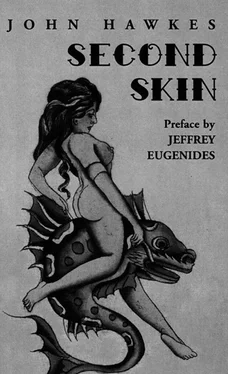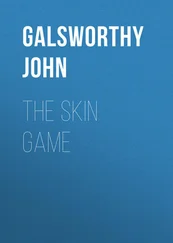A waxen tableau, no doubt the product of a slight and romantic fancy. Yet I prefer this vision to my father’s death. And by way of partial explanation, at least, I should make note of one concrete circumstance: that my mother, unable to bear the sound of the death-dealing shot — it must have lodged in her head like a shadow of the bullet that entered my father’s — deafened herself one muggy night, desperately, painfully, by filling both lovely ears with the melted wax from one of our dining room candles.
But on now to the erratic flight of the hummingbird — on to the high lights of my naked history.
She was in my arms and lifeless, nearly lifeless. Together we stood: the girl, young mother, war bride in her crumpled frock, and I in my cap and crumpled uniform of white duck — it was damp and beginning to soil after these nights awake, was bunched at the knees and down the front spotted with the rum and Coca-Cola from poor Sonny’s upset glass — I hardly able to smile, perspiring, sporting on my breast the little colorful ribbon of my Good Conduct Medal and on my collar the tarnished insignia of my rank, and unshaven, tired, burned slightly red and lost, thoroughly lost in this midnight Chinatown at the end of my tour of duty and still wearing in my forgetfulness the dark blue armband of the Shore Patrol, and so protected, protecting, I holding the nearly lifeless hand and feeling her waist growing smaller and smaller in the wet curve of my arm, feeling even her cold hand diminishing, disappearing from mine and wondering how to restore this poor girl who would soon be gone. I looked around, trying to catch sight of Sonny where he sat in the booth with Pixie. And suddenly I was aware of the blind, meaningless, momentary presence of her little breast against my own and I, regretting my sensitivity but regretting more the waste, the impossibility of bringing her to life again — there in the small fleshed locket of her heart — I wished all at once to abandon rank, insignia, medal, bald head, good nature, everything, if only I might become for a moment an anonymous seaman second class, lanky and far from home and dancing with this girl, but felt instead the loose sailors pressing against us, all of them in their idiotic two-piece suits and laced up tight, each one filling me with despair because she and I were dancing together, embracing, and there wasn’t even someone to give her a kiss. Here then was our celebration, the start of adventure and begining of misery — or perhaps its end— and I kept thinking that she was barelegged, had packed her only pair of stockings — black market, a present from me — in the small tattered canvas bag guarded now between Sonny’s feet.
There should have been love in our dark and nameless Chinatown café. But there was only an hour to spare, only the shot-glasses flung like jewels among the sailors — each provided with his pocket comb, French letters, gold watch and matching band — only the noise, the smoke, the poster of the old national goat-faced man over the bar, the sound of the record and torch singer, orchestra, a song called “Tangerine,” only the young boys with their navy silk ties and Popeye hats, crowded elbows and bowls of boiled rice; only this night, the harbor plunging with battleships, the water front blacked-out, bloody with shore leave and sick with the bodies of young girls sticking to the walls of moist unlighted corridors; only our own café and its infestation of little waiters smiling their white-slave smiles and of sailors pulling down their middies, kicking their fresh white hornpipe legs; only ourselves — agitated eccentric naval officer, well-meaning man, and soft young woman, serious, downcast — only ourselves and in the middle of no romance.
So in the shame and longing of my paternal sentiment, flushed and bumbling, I felt her knee, her hip, once more her breasts— they were of a child in puberty though she was twenty-five— and touched the frock which I had found tossed over the back of the hotel sofa. I glanced down at her head, at the hair pinned up and her neck bare, at her face, the beautiful face which reminded me suddenly of a little death mask of Pascal. From one wrist she carried a dangling purse, and when it swung against my ribs— dull metronome of our constrained and hollow dance — I knew it was an empty purse. No stockings, no handkerchief, no lipstick or keys; no love, no mother, no Fernandez. There among all those sailors in the smoke, the noise, I pulled her to me, wincing and lunging both as I felt imprinted on my stomach the shape of hers, and felt all the little sinews in her stomach banding together, trembling. It was midnight — Pacific War Time — and I tried to collect myself, tried to put on a show of strength in my jaw.
“I’ve never been afraid of the seeds of death,” I said, tightening my arm, staring over her head at the litter of crushed cherries and orange rind wet on the bar, “and if I were you I wouldn’t blame Gertrude for what she did.” We executed a fairly rakish turn, bumped from the rear, blocked by the tall airy figure of a bosun’s mate — the uniform was stuffed against his partner in an aghast paralysis of love, bell-bottoms wrapped tight around the woman’s ankles, the man’s white face swaying in an effort to toss aside the black hair drenched in rum — and I looked down into my own partner’s eyes which were lifted to mine at last and which were as clear as sea shells, the pupils gray and hard, the irises suddenly returning to sight like little cold musical instruments. I sighed — my sigh was a hot breath on her dry lips — I blushed, I got my wind again, and it was a mouthful of smoke, mouthful of rum, fragrance of salty black sauce and yellow plague.
“As you know,” I said, “I grew up very familiar with the seeds of death; I had a special taste for them always. But when I heard about Gertrude something happened. It was as if I had struck a new variety. Her camel’s-hair coat, her pink mules, her cuticle sticks scattered on the floor, her dark glasses left lying on the unmade bed in the U-Drive-Inn, I saw the whole thing, for that moment understood her poor strangled solitude, understood exactly what it is like to be one of the unwanted dead. Suddenly Gertrude and I were being washed together in the same warm tide. But in our grief we were casting up only a single shadow— you.”
Quickly, artfully, I gave the bosun’s mate a shove with my sea-going hip and, heavy as I was, stood hovering, sagging in front of Cassandra. I held her, with a moistened finger I touched her dry mouth, I raised her chin — unsmiling dimple, unblemished curve of her little proud motherhood — I watched her gray eyes and I waited, waited for the sound of the voice which was always a whisper and which I had never failed to hear. And now the eyes were tuned, the lips were unsealed — moving, opening wide enough to admit a straw — I was flooded with the sound of the whisper and sight of a tiny golden snake wriggling up the delicate cleft of her throat — still no smile, never a smile — and curling in a circle to pulse, to die, in the shallow white nest of her temple.
“I think you would like to know,” she began, whispering, spacing the words, “you would like to know what I did with the guitar. Well, I burned it. Pixie and I burned it together.” And in her whispered seriousness, the hush of her slow enunciation, I heard then the snapping of flames, the tortured singing of those red-hot strings. Even as I dropped her hand, let go of her waist, brought together my fat fingers where the Good Conduct Ribbon like a dazzling insect marked the spot of my heart in all that wrinkled and sullied field of white, even as I struggled with the tiny clasp — pinprick, drop of blood, another stain — and fastened the ribbon to the muslin of her square-collared rumpled frock, even while I admired my work and then took her into my arms again, hugging, kissing, protecting her always and always, and even while I gave her the Good Conduct Medal — she the one who deserved it; I, never — and shook long and happily in my relief: through all this hectic and fragile moment I distinctly heard the gray whisper continuing its small golden thread of intelligence exactly on the threshold of sound and as fine and formidable as the look in her eye.
Читать дальше












